UPSC Daily Current Affairs- 14th April 2024 | Current Affairs & Hindu Analysis: Daily, Weekly & Monthly PDF Download
GS-I
Significance of the Mahad Satyagraha
Subject: History and Culture
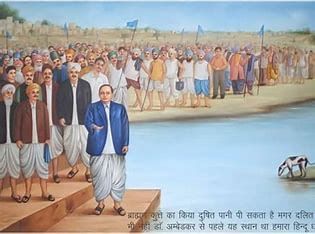
Why in News?
As the nation celebrates the 133rd birth anniversary of Babasaheb Ambedkar, one of his most significant contributions - the Mahad Satyagraha of 1927, is worth recalling.
Background of the Satyagraha:
- The Bombay Legislative Council passed a resolution in 1923 allowing Untouchables to use public places funded by the public. Despite this, the situation did not improve.
- Ramchandra Babaji More, a political leader in Mahad, invited Ambedkar to preside over a conference of Untouchables in Mahad in 1927.
Events at the Mahad Satyagraha:
- Initially termed a conference, the event was attended by about 2,500 delegates from various districts of Maharashtra and Gujarat.
- During the conference, a decision was made to march to the Chavadar tank to implement the 1923 resolution. Ambedkar personally collected water from the tank.
Reaction of Upper Caste Hindus and Impact:
- Upper caste Hindus performed a purification ritual of the tank in response to the Dalits' actions.
- Ambedkar announced a larger conference in December 1927, termed as a Satyagraha, to exhibit the determination of the Dalit community.
Significance of Mahad Satyagraha:
- This event is hailed as the foundational moment of the Dalit movement, leading to the observation of Social Empowerment Day on March 20 in India.
- It marked the first collective stand of the community against the caste system under Ambedkar's leadership, setting the stage for future movements challenging caste practices.
- Ambedkar's involvement in the Satyagraha was pivotal in his political journey, establishing him as a leader for the marginalized in the country.
Source: Indian Express
How the Jallianwala Bagh Massacre Changed the Course of India's Freedom Struggle?'
Subject: History and Culture
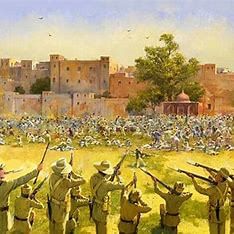
Why in News?
The Jallianwala Bagh massacre (on April 13, 1919) was a pivotal moment in the course of India’s struggle for independence, as it marked a turning point in Indians’ relationship with their British colonisers.
Background of the Jallianwala Bagh Massacre
- Following the enactment of the oppressive Rowlatt Act in 1919, Punjab witnessed escalating tensions similar to the rest of India.
- In response to the unjust arrests of pro-independence leaders Dr. Saifuddin Kitchlew and Dr. Satya Pal, a large gathering convened at Jallianwala Bagh in Amritsar during the annual Baishakhi fair.
Events at the Jallianwala Bagh
- Fearing an uprising akin to 1857, Michael O'Dwyer, the then Lieutenant Governor of Punjab, sanctioned Brigadier-General Reginald Dyer to open fire on the crowd on April 13, 1919.
British Reaction to the Massacre
- Initially, the British administration in Punjab justified Dyer's actions. Despite this, many Britons, both in India and in Britain, viewed him as a savior of British dominion in India.
- The subsequent Hunter Commission, formed in 1919 to probe the Jallianwala Bagh events, defended Dyer's decision to fire upon the gathering, albeit suggesting that a warning should have preceded the action.
Impact on India's Freedom Movement
- The appalling events at Jallianwala Bagh profoundly shook the nation's conscience, eroding any remnants of moral authority the British Raj had in India. Even the most moderate Indian nationalists lost faith in the Empire. Renowned poet and Nobel laureate Rabindranath Tagore renounced his knighthood in protest.
- Shortly after, Mahatma Gandhi initiated the Non-Cooperation - Khilafat Movement, marking the inception of a nationwide struggle for India's independence.
Source: Indian Express
Catastrophic Soil Erosion
Subject: Geography
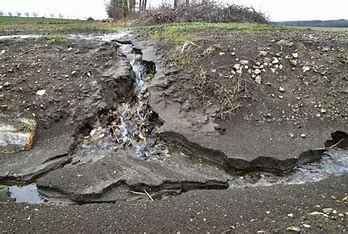
Why in News?
Recently, a study ‘Geospatial modelling and mapping of soil erosion in India’ classified soil erosion on a pan-India basis for the first time.
Overview
- Soil erosion refers to the breakdown, detachment, transport, and redistribution of soil particles by forces like water, wind, or gravity.
- Wind and water play significant roles in soil erosion by removing and transporting soil.
Types of Soil Erosion
- Sheet erosion occurs on level lands after heavy showers, removing the topsoil.
- Gully erosion is common on steep slopes, deepening with rainfall and making land unfit for cultivation.
Extent of the Issue
- India faces varying levels of soil erosion, from 'minor' to 'catastrophic' categories.
- Approximately 30% of India's landmass experiences minor soil erosion, while 3% faces catastrophic topsoil loss.
Worst-Affected Regions
- Brahmaputra Valley in Assam: This area is a major hotspot for soil erosion in India, losing significant surface soil to erosion.
- Lower reaches of the Himalayas: Regions characterized by loose soil and unstable slopes, extending into Nepal and parts of Odisha.
Impacts of Soil Erosion
- The loss of soil affects land fertility, water-holding capacity, and overall ecosystem health.
- Soil erosion poses a threat to the region's biodiversity and agricultural productivity.
Call to Action
- Urgent strategies are needed to combat soil erosion in India, including prevention and land restoration efforts.
- Addressing soil erosion is crucial for maintaining agricultural productivity, food security, and rural livelihoods.
Conclusion
- The study emphasizes the importance of preventing soil erosion and rehabilitating degraded lands in India.
- As the country pursues sustainable development goals, tackling soil erosion should be a top priority.
Source: DTE
GS-II
India and Mauritius Relations
Subject: International Relations
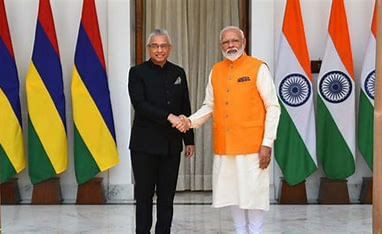
Why in News?
A revised tax treaty between India and Mauritius will come into effect upon signing, without retrospective application.
About
- The updated treaty introduces a principal purpose test to determine eligibility for tax benefits on investments.
- No tax benefits will be provided for investments if it is evident that seeking tax advantages motivated the transaction.
Overview of India and Mauritius Relations
- India shares enduring diplomatic ties with Mauritius, an island nation in the Western Indian Ocean.
- Establishment of Diplomatic Relations: India and Mauritius initiated diplomatic relations in 1948 and have evolved into significant trading partners in Asia.
- Cultural Ties: The National Day of Mauritius is celebrated annually on March 12 in honor of Gandhiji and India's freedom movement.
- Commercial Relations: India has been a key trading partner of Mauritius since 2005, with substantial trade volumes.
- Double Taxation Avoidance Agreement: The bilateral agreement signed in 1982 facilitates non-resident investors in avoiding double taxation.
- Defence Cooperation: India is a preferred defence ally for Mauritius, engaging in various collaborations such as equipment transfer and joint patrolling.
Areas of Concern
- Tax Treaty Misuse: Previous concerns over the Double Taxation Avoidance Agreement's misuse for illicit activities like money laundering.
- Security Challenges: With Mauritius gaining importance in the Indo-Pacific region, security issues have become crucial.
- Economic Issues: Despite being major economic partners, trade imbalances and the necessity to diversify trade remain challenges.
- Presence of China: Growing involvement of external powers like China in Africa and the Indian Ocean region raises strategic concerns for India.
Way Ahead
- India and Mauritius share a multifaceted relationship that has strengthened over time, with collaborations in various sectors.
- Continuous Engagement: India should not overlook its influence in Mauritius and must enhance its involvement with the island nation.
Source: Indian Express
Switzerland to Host Ukraine Peace Summit
Subject: International Relations
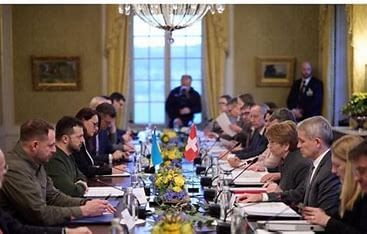
Why in News?
Switzerland is set to host a significant international conference involving over 100 countries to facilitate peace discussions for Ukraine after a prolonged period of conflict.
Background and Purpose of the Conference
- Switzerland has taken the initiative at the behest of Ukraine's President Volodymyr Zelenskyy.
- The primary goal of the conference is to establish a platform for high-level dialogues aimed at achieving a comprehensive, just, and enduring peace for Ukraine based on international law and the UN Charter.
- Earlier events hosted by Switzerland include the Ukraine Recovery Conference (URC) in Lugano in July 2022 and a National Security Advisors Meeting in Davos in 2024.
Swiss History of Mediation
- Switzerland's foreign policy is anchored in neutrality, exemplified by its role in safeguarding the interests of conflicting parties during historical conflicts.
- Throughout various international crises, Switzerland has acted as a mediator, including facilitating talks between conflicting nations like India and Pakistan, Sri Lanka, and the Liberation Tigers of Tamil Eelam.
Russia's Stand
- Russia will not participate in the initial meeting but acknowledges its importance in the peace process, highlighting the necessity to address its security concerns and the current dynamics.
India's Role in the Peace Process
- India is encouraged to join the conference among 120 other nations at the level of Heads of State/Government, emphasizing its commitment to dialogue and diplomacy throughout the Ukraine conflict.
- India's stance on remaining neutral and supportive of peace processes is underscored by its abstention from voting against Russia in UN Security Council resolutions.
- Ukraine has solicited India's backing on a comprehensive "peace formula," outlining key provisions such as the withdrawal of Russian troops, prisoner release, and ensuring Ukraine's territorial integrity and security.
Way Ahead
- The conference aims to devise a concrete roadmap for the peace process, recognizing that Russia's interests are integral for any sustainable solution.
- The engagement is viewed as a preliminary step, with potential for Moscow's involvement in subsequent stages based on ongoing discussions and the conflict's progression.
- For India, active participation presents an opportunity to influence global deliberations, aligning with its aspirations for a permanent seat on the UN Security Council.
Source: Indian Express
GS-III
Platelets
Subject: Science and Technology
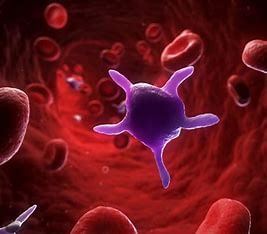
Why in News?
Researchers have created artificial platelets to halt bleeding and accelerate healing at injury sites.
About Platelets
- Platelets, also known as thrombocytes, are tiny, colorless cell fragments present in our blood that aid in clotting. They serve as the body's natural bandage to stop bleeding.
- Origin: Platelets are produced in the soft tissue of bones, specifically in the bone marrow. The largest cells in the bone marrow, called megakaryocytes, are responsible for generating platelets.
- Shape and Size: Platelets are shaped like plates, which is the origin of their name. They are smaller than red or white blood cells.
Platelets' Role in Controlling Bleeding
- Mechanism: When a blood vessel is injured, it signals the platelets. Subsequently, the platelets rush to the site of injury and create a plug (clot) to repair the damage.
- Adhesion: The process of spreading over the damaged blood vessel's surface to stop bleeding is known as adhesion. Platelets develop adhesive tentacles at the injury site to stick together.
- Aggregation: Platelets release chemical signals to attract more platelets to the injury site. Additional platelets accumulate on the clot through aggregation.
Healthy Platelet Count
- Normal Range: A typical platelet count falls between 150,000 and 450,000 platelets per microliter of blood.
- Conditions: Exceeding 450,000 platelets leads to thrombocytosis, while fewer than 150,000 results in thrombocytopenia.
- Symptoms: Low platelet levels can cause easy bruising, abnormal bleeding (e.g., excessive bleeding from minor cuts), or blood in urine or stool.
Source: Medicalxpress
ISRO's 'Zero Orbital Debris' Milestone
Subject: Science and Technology
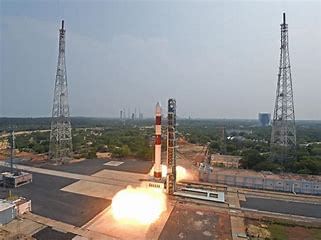
Why in News?
The Indian Space Research Organisation (ISRO) has said its PSLV-C58/XPoSat mission has practically left zero debris in earth’s orbit.
Space Debris
- Space debris refers to all non-functional, man-made objects in Earth's orbit or re-entering the Earth's atmosphere.
- One significant concept related to space debris is the Kessler Syndrome, which describes a scenario of cascading collisions leading to a proliferation of debris in low Earth orbit.
International Agreements on Space Debris
- The Space Liability Convention of 1972 outlines the responsibility in case a space object causes harm and defines liability for damages.
- While there are agreements in place regarding liability, there is currently an absence of specific laws addressing space debris re-entering Earth.
About the Mission
- The PSLV-C58 Mission, completed in January 2024, involved the launch of XPoSat.
- Following the primary mission, the PSLV's final stage was repurposed into the PSLV Orbital Experimental Module-3 (POEM-3) for further experimentation.
- The POEM-3 was deorbited from 650 km to 350 km, allowing for its early re-entry into the Earth's atmosphere.
Significance of the Mission
- The POEM-3 provides a cost-effective platform for various space experiments, benefiting startups, universities, and NGEs.
- Startups and institutions have utilized this platform for experiments involving technologies like electric thrusters and satellite dispensers.
Project NETRA
- Initiated by ISRO, Project NETRA (Network for Space Object Tracking and Analysis) aims to establish an early warning system for detecting space hazards to Indian satellites.
- Through Project NETRA, India aims to enhance its space situational awareness (SSA) capabilities, crucial for safeguarding its satellites from potential threats, including debris.
Source: NDTV
Global Forest Watch (GFW)
Subject: Environment and Ecology

Why in News?
India has lost 2.33 million hectares of tree cover since 2000, according to the latest data from the Global Forest Watch monitoring project.
About Global Forest Watch (GFW):
- Global Forest Watch (GFW) is an open-source web application that monitors global forests in near real-time utilizing satellite data and other sources.
- The project is managed by the Washington-based nonprofit research organization, the World Resources Institute (WRI).
- GFW is user-friendly, allowing individuals to create custom maps, analyze forest trends, receive alerts, and download data for specific regions or globally.
- When referring to forest extent, loss, and gain, GFW focuses on tree cover. This metric is convenient for monitoring changes as it is easily measurable from space using medium-resolution satellite imagery.
Highlights of GFW's Annual Forest Loss Data:
- The decline in the loss of primary forests (untouched by humans) in the tropics was 9% lower last year compared to 2022.
- Approximately 37,000 square kilometers of tropical primary forest were lost globally last year, an area nearly the size of Switzerland.
- Top tropical countries with significant primary forest losses include Brazil, the Democratic Republic of Congo, and Bolivia.
- Global deforestation increased by 3.2% in 2023.
- India witnessed a 6% decrease in tree cover, losing 2.33 million hectares since 2000.
- Between 2001 and 2022, India's forests emitted 51 million tons of carbon dioxide equivalent annually and sequestered 141 million tons annually, resulting in a net carbon sink of 89.9 million tons per year.
- An average of 51.0 million tons of carbon dioxide equivalent was released annually in India due to tree cover loss.
- 95% of tree cover loss in India from 2013 to 2023 occurred within natural forests.
- Five states in India accounted for 60% of all tree cover losses between 2001 and 2023, with Assam, Mizoram, Arunachal Pradesh, Nagaland, and Manipur experiencing significant losses.
Source: DTE
|
53 videos|5389 docs|1140 tests
|
FAQs on UPSC Daily Current Affairs- 14th April 2024 - Current Affairs & Hindu Analysis: Daily, Weekly & Monthly
| 1. What was the significance of the Mahad Satyagraha? |  |
| 2. How did the Jallianwala Bagh Massacre change the course of India's freedom struggle? |  |
| 3. What is the significance of catastrophic soil erosion? |  |
| 4. How do India and Mauritius maintain their relations? |  |
| 5. What is ISRO's 'Zero Orbital Debris' Milestone? |  |
















